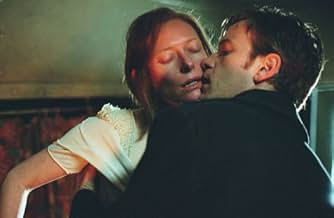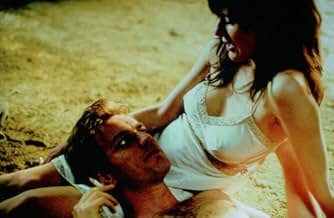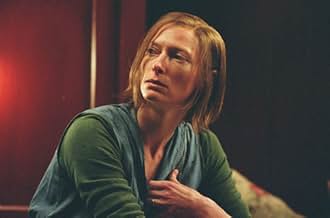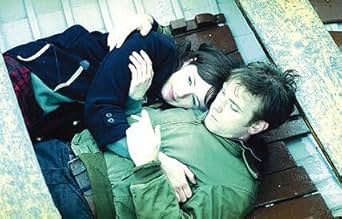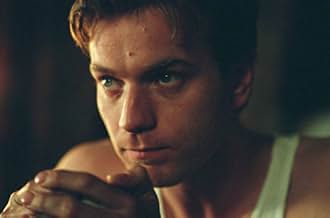A young drifter working on a river barge disrupts his employers' lives while hiding the fact that he knows more about a dead woman found in the river than he admits.A young drifter working on a river barge disrupts his employers' lives while hiding the fact that he knows more about a dead woman found in the river than he admits.A young drifter working on a river barge disrupts his employers' lives while hiding the fact that he knows more about a dead woman found in the river than he admits.
- Director
- Writers
- Stars
- Awards
- 7 wins & 17 nominations total
- Director
- Writers
- All cast & crew
- Production, box office & more at IMDbPro
Featured reviews
Who is Alexander Trocchi? He's the author of a Brit Beat cult novel called Young Adam and a fascinating figure of whose writing William S. Burroughs once said `He has been there and brought it all back.' Fledgling Scottish director David Mackenzie has brought it all back to the screen, having performed the difficult feat of getting adequate funds to film Young Adam and gathered an able cast headed by Ewan MacGregor, Tilda Swinton, and Peter Mullen to act in it.
A worthwhile project and a logical one for those involved. It makes sense that MacGregor of Trainspotting and Shallow Grave and Mullen of Trainspotting should try to jumpstart British cinema again by bringing this bold forgotten classic set in Scotland to the screen. The result may not be a revolution, but it's a good watch, a beautiful dark lusty little movie with some rare nooks and crannies to it.
Indeed it was Trainspotting author Irvine Welsh who spearheaded the revival of interest in Trocchi and his novel. Glasgow-born Trocchi (who died in '84) spent so many years as a wild drug intellectual figurehead in Paris, the US, and England that people had pretty much forgotten he'd been a good writer admired for his style and his "sexistential" plots.
Besides being a heroin-opium-cocaine-marijuana addict, pimp, magazine editor, translator and rare book seller who never gave up the wan hope that he'd do some good writing again, Trocchi once also penned pornography for cash. His own lust sticks out all over this story, as does his freewheeling sensualist nihilism.
The sexually predatory Joe (MacGregor) is a failed writer with a dark secret who's run off to become a hired hand on a barge running coal along the Forth and Clyde canal between Glasgow and Edinburgh. Ella Gault -- a typically powerful, merciless role for the bold and talented Swinton -- is the barge owner, often contemptuous of her husband Les (Peter Mullen). It's obvious Joe and Ella are going to be between the sheets in short order. We suspect also that as in Jean Vigo's classic Parisian barge film L'Atalante, somebody's going to have to leave. The small world is made even smaller by the presence of a son, `the kid' Jim (Jack McElhone) who peeks through cracks to see the humping. This is the Kitchen Sink School of adultery.
Before long Les gets the picture and moves off, but we know from flashbacks and concurrent affairs that Joe is a stranger to commitment. Eventually it emerges that he knew a lot more than he said about the body of the girl in the slip he and Les fished out of the canal at the movie's outset. The story that unfolds about that body and its owner is a huge example of Joe's endless capacity for non-commitment. Could it be there's more than a little of Alexander Trocchi in Joe Taylor? You bet. But Joe's a pre-drug Trocchi whose only substances are the alcohol he gets in pubs and the cigarettes he always has dangling from his mouth.
The lusty nihilism of this story may owe something to Henry Miller, but it's more usually described as a sensual and earthy version of Camus's The Stranger, and like The Stranger, Young Adam has a trial at the end (it seems somewhat patched in, and it is it's not in the book). Joe experiences greater priapic pleasure than Camus's Meursault. He doesn't seem to get a lot of fun out of it, though. He's a failed author making it with every woman who comes along to forget his writer's block and his guilt. He's a handsome, sexy devil who doesn't so much seduce women as look them in the eye and wait to pounce. It's hard to see how anybody else could be better than Ewan McGregor in this role. Working on home turf again for a change -- like Colin Farrell in the casual, quick-witted recent Irish film Intermission -- MacGregor has never looked or acted better. Swinton, Mullen, and Emily Mortimer (as the former girlfriend) are equally good.
Mackenzie's postwar Glasgow canal world is an authentic-feeling place where the interiors are chiaroscuro and exteriors bleached out and tinged with yellow. The shots are often striking in unexpected ways. The trouble with the movie is it isn't emotionally affecting. The wild sex scenes including the notorious ketchup rape -- are no more than bodies rudely colliding. There's more beauty in the arch of McGregor's eyebrows or the rust of a barge in the late sunlight. There's a grimy glamour also to the barge interiors, the luminous air of the pubs, canalside humps and slick dark streets; but the hero's aimlessness destroys momentum and the movie fizzles out at the end.
As Joe drifts through Young Adam the present is mixed with the flashbacks of an equally aimless past and things get a bit confusing. There isn't any of the acid trip intensity (and ultimate clarity) of Cronenberg's brilliant Spider and the pace drags at times. Let's hope Mackenzie's work on his next movie pans out: it's an adaptation of Spider author Patrick McGrath's novel Asylum. His first movie was a fiasco. This interesting effort is his second. With luck he may make another leap forward next time.
A worthwhile project and a logical one for those involved. It makes sense that MacGregor of Trainspotting and Shallow Grave and Mullen of Trainspotting should try to jumpstart British cinema again by bringing this bold forgotten classic set in Scotland to the screen. The result may not be a revolution, but it's a good watch, a beautiful dark lusty little movie with some rare nooks and crannies to it.
Indeed it was Trainspotting author Irvine Welsh who spearheaded the revival of interest in Trocchi and his novel. Glasgow-born Trocchi (who died in '84) spent so many years as a wild drug intellectual figurehead in Paris, the US, and England that people had pretty much forgotten he'd been a good writer admired for his style and his "sexistential" plots.
Besides being a heroin-opium-cocaine-marijuana addict, pimp, magazine editor, translator and rare book seller who never gave up the wan hope that he'd do some good writing again, Trocchi once also penned pornography for cash. His own lust sticks out all over this story, as does his freewheeling sensualist nihilism.
The sexually predatory Joe (MacGregor) is a failed writer with a dark secret who's run off to become a hired hand on a barge running coal along the Forth and Clyde canal between Glasgow and Edinburgh. Ella Gault -- a typically powerful, merciless role for the bold and talented Swinton -- is the barge owner, often contemptuous of her husband Les (Peter Mullen). It's obvious Joe and Ella are going to be between the sheets in short order. We suspect also that as in Jean Vigo's classic Parisian barge film L'Atalante, somebody's going to have to leave. The small world is made even smaller by the presence of a son, `the kid' Jim (Jack McElhone) who peeks through cracks to see the humping. This is the Kitchen Sink School of adultery.
Before long Les gets the picture and moves off, but we know from flashbacks and concurrent affairs that Joe is a stranger to commitment. Eventually it emerges that he knew a lot more than he said about the body of the girl in the slip he and Les fished out of the canal at the movie's outset. The story that unfolds about that body and its owner is a huge example of Joe's endless capacity for non-commitment. Could it be there's more than a little of Alexander Trocchi in Joe Taylor? You bet. But Joe's a pre-drug Trocchi whose only substances are the alcohol he gets in pubs and the cigarettes he always has dangling from his mouth.
The lusty nihilism of this story may owe something to Henry Miller, but it's more usually described as a sensual and earthy version of Camus's The Stranger, and like The Stranger, Young Adam has a trial at the end (it seems somewhat patched in, and it is it's not in the book). Joe experiences greater priapic pleasure than Camus's Meursault. He doesn't seem to get a lot of fun out of it, though. He's a failed author making it with every woman who comes along to forget his writer's block and his guilt. He's a handsome, sexy devil who doesn't so much seduce women as look them in the eye and wait to pounce. It's hard to see how anybody else could be better than Ewan McGregor in this role. Working on home turf again for a change -- like Colin Farrell in the casual, quick-witted recent Irish film Intermission -- MacGregor has never looked or acted better. Swinton, Mullen, and Emily Mortimer (as the former girlfriend) are equally good.
Mackenzie's postwar Glasgow canal world is an authentic-feeling place where the interiors are chiaroscuro and exteriors bleached out and tinged with yellow. The shots are often striking in unexpected ways. The trouble with the movie is it isn't emotionally affecting. The wild sex scenes including the notorious ketchup rape -- are no more than bodies rudely colliding. There's more beauty in the arch of McGregor's eyebrows or the rust of a barge in the late sunlight. There's a grimy glamour also to the barge interiors, the luminous air of the pubs, canalside humps and slick dark streets; but the hero's aimlessness destroys momentum and the movie fizzles out at the end.
As Joe drifts through Young Adam the present is mixed with the flashbacks of an equally aimless past and things get a bit confusing. There isn't any of the acid trip intensity (and ultimate clarity) of Cronenberg's brilliant Spider and the pace drags at times. Let's hope Mackenzie's work on his next movie pans out: it's an adaptation of Spider author Patrick McGrath's novel Asylum. His first movie was a fiasco. This interesting effort is his second. With luck he may make another leap forward next time.
Okay, this film isn't for everyone. A little dreary, a little bleak, and the love scenes weren't always attractive, but something in the dark simplicity got me.
McGregor is incredibly versatile, I didn't think once of the bohemian poet Christian, or of Obi Wan... he's taken on an unlikeable character with a slow moving plot and pulled it off beautifully.
Tilda Swinton plays the antithesis of a Hollywood seductress, which makes some of the love scenes uncomfortable, but refreshing. The acting, as a whole, is the entire film. The action between characters is subtle and intense, and although I may be biased as an Ewan fan, I thought it was perfect for a dark, rainy night!
McGregor is incredibly versatile, I didn't think once of the bohemian poet Christian, or of Obi Wan... he's taken on an unlikeable character with a slow moving plot and pulled it off beautifully.
Tilda Swinton plays the antithesis of a Hollywood seductress, which makes some of the love scenes uncomfortable, but refreshing. The acting, as a whole, is the entire film. The action between characters is subtle and intense, and although I may be biased as an Ewan fan, I thought it was perfect for a dark, rainy night!
One of the more quietly desperate films of recent past, Young Adam is an interesting study of lower working class characters - working poor, perhaps set against an idyllic Scotland river life we have probably never seen. That working barges ply streams with bridges so narrow that crew must guide the craft along by kicking the tunnel-like sides of passage and canals and rivers are so pastorally picturesque is an awfully artful examination of a simpler time.
Joe (Ewan McGregor), a hired hand laboring on a barge-of-all-trades is the bad-boy promiscuous lover of any and all girls within contact. Torrid sex with any and all of them is his single-minded purpose, we gather at first. But we quickly find he 1.) is or was a writer (failed or perhaps more correctly never-started) 2) is linked to a body found in a river and 3) is seemingly incapable of or devoid of emotion. But we are going to alter some our judgments of Joe as more is revealed.
Sexual promiscuity confined to abrupt, even relentless encounters is the main character's focus even though we know it is as unfeelingly given as it seems to be received. In one encounter, nearly violent in its depiction, we cannot see the face of his partner as she cries (or is she laughing?). Interestingly lit, we marvel at this singularly stark depiction of lust. Ella (Tilda Swinton) and her husband Les (Peter Mullan) have employed Joe on their barge and it is not long before we see how Joe has changed the dynamic in the marriage. It is with Les that Joe recovers the body of a woman floating in the river. Curiously Joe cannot manage the use of a boat hook to snare the woman's body; Les has to take over.
The story becomes one of determining who the woman is and how she fits into the story. Through flashbacks we see a disturbing development as as the police investigation of the dead woman ensues; we continue to follow this thread through the course of the film.
The music chosen for the film is unmemorable, but that may serve us well in that it is never a distraction. Time passes during the course of the story, but it could be a week, perhaps six months.
An interesting film, the title has been bandied about for its Biblical reference but reveals little about the matters at hand. In the final analysis the only surprise found in the movie is when a prominent figure merely disappears; consistent with the tempo, it is a profoundly quiet moment. Disturbing at every turn, this is a film charged with raw sexuality and should be seen to appreciate naturalistic film.
Joe (Ewan McGregor), a hired hand laboring on a barge-of-all-trades is the bad-boy promiscuous lover of any and all girls within contact. Torrid sex with any and all of them is his single-minded purpose, we gather at first. But we quickly find he 1.) is or was a writer (failed or perhaps more correctly never-started) 2) is linked to a body found in a river and 3) is seemingly incapable of or devoid of emotion. But we are going to alter some our judgments of Joe as more is revealed.
Sexual promiscuity confined to abrupt, even relentless encounters is the main character's focus even though we know it is as unfeelingly given as it seems to be received. In one encounter, nearly violent in its depiction, we cannot see the face of his partner as she cries (or is she laughing?). Interestingly lit, we marvel at this singularly stark depiction of lust. Ella (Tilda Swinton) and her husband Les (Peter Mullan) have employed Joe on their barge and it is not long before we see how Joe has changed the dynamic in the marriage. It is with Les that Joe recovers the body of a woman floating in the river. Curiously Joe cannot manage the use of a boat hook to snare the woman's body; Les has to take over.
The story becomes one of determining who the woman is and how she fits into the story. Through flashbacks we see a disturbing development as as the police investigation of the dead woman ensues; we continue to follow this thread through the course of the film.
The music chosen for the film is unmemorable, but that may serve us well in that it is never a distraction. Time passes during the course of the story, but it could be a week, perhaps six months.
An interesting film, the title has been bandied about for its Biblical reference but reveals little about the matters at hand. In the final analysis the only surprise found in the movie is when a prominent figure merely disappears; consistent with the tempo, it is a profoundly quiet moment. Disturbing at every turn, this is a film charged with raw sexuality and should be seen to appreciate naturalistic film.
If you love film, you know the first Polanski project, "Knife in the Water." It is a simple project: a couple, plus an extra man, confined on a boat. Sex.
It is an important project, taking the seat of the characters and extending it into a space around them. The challenge for the actors is to project out into a haze that surrounds them. It only works because the space is confined, incidentally in a boat. Orson Welles conceived the idea but his project was unfinished. Polanski finished it.
Polanski's project was told from the perspective of the couple. Presumably the man is a lawyer with his out-of-law wife (his mistress). It is all about laws of various kinds.
Now imagine a project with the identical approach but told from the point of the drifter. What is his story? What is his haze?
Watch the two together if you dare. This time around we have a more ostentatious art: beautiful staging, terrific lighting, hazy score. Absolutely controlled and contained acting. And yet at the same time we have the haze extending to grit, humanity, sweat, rutting.
This time around that reality gives us more explicit and human sex. And more explicit law.
You need to watch this, folks. It is intrinsically deep and engaging. Slow. Meditative. As with a Rembrandt, the meditative but intense emotion draws you into the haze, here shown many times as shadow (or coal dust, or water).
One of our most serious actresses is Ms Tilda. I'll watch anything she chooses to throw herself into.
Ewan chooses intelligent projects. You will discover that our drifter is a writer trying to do something different. It is why things are so hazy and non-linear, the typewriter underwater. The one explicitly folded shot quotes his "Moulin Rouge" folded typing.
If you want to understand how actors put themselves on their skin, then their sweat, then the haze around them that is shared, then into your own haze... watch this.
Ted's Evaluation -- 3 of 3: Worth watching.
It is an important project, taking the seat of the characters and extending it into a space around them. The challenge for the actors is to project out into a haze that surrounds them. It only works because the space is confined, incidentally in a boat. Orson Welles conceived the idea but his project was unfinished. Polanski finished it.
Polanski's project was told from the perspective of the couple. Presumably the man is a lawyer with his out-of-law wife (his mistress). It is all about laws of various kinds.
Now imagine a project with the identical approach but told from the point of the drifter. What is his story? What is his haze?
Watch the two together if you dare. This time around we have a more ostentatious art: beautiful staging, terrific lighting, hazy score. Absolutely controlled and contained acting. And yet at the same time we have the haze extending to grit, humanity, sweat, rutting.
This time around that reality gives us more explicit and human sex. And more explicit law.
You need to watch this, folks. It is intrinsically deep and engaging. Slow. Meditative. As with a Rembrandt, the meditative but intense emotion draws you into the haze, here shown many times as shadow (or coal dust, or water).
One of our most serious actresses is Ms Tilda. I'll watch anything she chooses to throw herself into.
Ewan chooses intelligent projects. You will discover that our drifter is a writer trying to do something different. It is why things are so hazy and non-linear, the typewriter underwater. The one explicitly folded shot quotes his "Moulin Rouge" folded typing.
If you want to understand how actors put themselves on their skin, then their sweat, then the haze around them that is shared, then into your own haze... watch this.
Ted's Evaluation -- 3 of 3: Worth watching.
By halfway through this story, the biblical underpinnings become firmly apparent: this is an allegory for The First Man, and his base, animal instincts. Hence, it's a tried and true thematic device, used by many authors: for example, in the tradition of Saturday Night and Sunday Morning (1960), Sons and Lovers (1960), and many other films that explore sexual transgressions coupled with (no pun intended) unrelenting naked desire, the author, Alexander Trocchi, presents his version of the modern Adam – always on the make, and totally suffused with his own animal desires and his pretentious efforts at self-fulfillment.
In truth, the Young Adam of this story, Joe Taylor (Ewan McGregor) is portrayed as, at best, misanthropic and crypto-misogynistic. Taken to extreme, Young Adam could be borderline sociopath in another story and setting. This is not satire, however, as with Patrick Bateman (deliciously played by Christian Bale) in American Psycho (2000). No, this is a reality that existed in the 1950s setting of the novel and which remains a stigma within all humans today. In truth, I think it was St.Jerome, in one of the biblical stories, who moaned about his need for release from his sexual depravities. But, nothing much changes in human relationships, from antiquity to now.
In a manner, you can look at this story as Ingmar Bergman for the poorer masses – another version of dirty scenes from a dirty marriage: because in this plot, the unwashed Joe is presented with a moral dilemma as the story progresses: am I truly my brother's keeper? So, the question for him, finally, is: will he be able to rise above his animality and achieve a humanity that he has avoided throughout his young life to date?
McGregor's acting in this story is stunning; so also Tilda Swinton as Young Adam's latest sexual conquest (Ella) aboard a coal-carrying canal barge (aptly named Atlantic Eve) where he thinks he's escaping from his responsibilities. Poor Joe – he's such a slave to his desires, he just can't stop: on the barge, in alleyways, under trucks, on the floor, against a canal wall – anywhere for a quick hit, so that he can forget about his failure as an aspiring writer, among other things. To that extent, one is reminded of the controlled excesses in Last Tango in Paris (1972), where Marlon Brando gave his finest performance as another poor slave to animal passions. And, while on the topic, how can anybody forget sociopathic Frank Booth (Dennis Hopper) and his velvet fetish in Blue Velvet (1986)?
On the other hand, the same theme has been used for light or outrageous comedy with films such as Tom Jones (1963), Kubrick's masterpiece Barry Lyndon (1975) and Boogie Nights (1997), all worth seeing, simply because none hurt the psyche.
But, getting back to Joe – so ordinary Joe, a symbol for all men, young and older – as he fills his days as a canal-worker-slave, obtaining relief from boredom only when satisfying his slavish work in a different type of living canal. Significantly, the director has the barge enter a few dark, moist tunnels through which the barge travels – and with the men treading all over it, albeit somewhat delicately, and just enough to make sure they exit carefully.
You don't get symbols like that too often in films; a delight to savor, for the location and the execution.
The denouement for the story arrives when our Joe makes his moral choice – a choice so fundamental, you stare at his face, watching his look, the tortured eyes, the mouth, his eyebrows, all as an expression of the raging dilemma within his animal/human brain. Rarely will you see such a choice done so well, and with such resigned finality – and a mirror for all of us to ponder in our darkest hours.
The supporting cast is exemplary, while the photography, sound and editing match the needs for such an important – and yet ordinary – story to be portrayed so professionally. Occasionally, it was momentarily difficult to sort out past, present and future; but not so much that the structure caused any unresolved confusion.
The NC-17 and R ratings are appropriate: this is not a film for children or adolescents. But, I highly recommend it for all adults – young and old – who are not afraid to look critically within themselves.
May 10, 2011.
In truth, the Young Adam of this story, Joe Taylor (Ewan McGregor) is portrayed as, at best, misanthropic and crypto-misogynistic. Taken to extreme, Young Adam could be borderline sociopath in another story and setting. This is not satire, however, as with Patrick Bateman (deliciously played by Christian Bale) in American Psycho (2000). No, this is a reality that existed in the 1950s setting of the novel and which remains a stigma within all humans today. In truth, I think it was St.Jerome, in one of the biblical stories, who moaned about his need for release from his sexual depravities. But, nothing much changes in human relationships, from antiquity to now.
In a manner, you can look at this story as Ingmar Bergman for the poorer masses – another version of dirty scenes from a dirty marriage: because in this plot, the unwashed Joe is presented with a moral dilemma as the story progresses: am I truly my brother's keeper? So, the question for him, finally, is: will he be able to rise above his animality and achieve a humanity that he has avoided throughout his young life to date?
McGregor's acting in this story is stunning; so also Tilda Swinton as Young Adam's latest sexual conquest (Ella) aboard a coal-carrying canal barge (aptly named Atlantic Eve) where he thinks he's escaping from his responsibilities. Poor Joe – he's such a slave to his desires, he just can't stop: on the barge, in alleyways, under trucks, on the floor, against a canal wall – anywhere for a quick hit, so that he can forget about his failure as an aspiring writer, among other things. To that extent, one is reminded of the controlled excesses in Last Tango in Paris (1972), where Marlon Brando gave his finest performance as another poor slave to animal passions. And, while on the topic, how can anybody forget sociopathic Frank Booth (Dennis Hopper) and his velvet fetish in Blue Velvet (1986)?
On the other hand, the same theme has been used for light or outrageous comedy with films such as Tom Jones (1963), Kubrick's masterpiece Barry Lyndon (1975) and Boogie Nights (1997), all worth seeing, simply because none hurt the psyche.
But, getting back to Joe – so ordinary Joe, a symbol for all men, young and older – as he fills his days as a canal-worker-slave, obtaining relief from boredom only when satisfying his slavish work in a different type of living canal. Significantly, the director has the barge enter a few dark, moist tunnels through which the barge travels – and with the men treading all over it, albeit somewhat delicately, and just enough to make sure they exit carefully.
You don't get symbols like that too often in films; a delight to savor, for the location and the execution.
The denouement for the story arrives when our Joe makes his moral choice – a choice so fundamental, you stare at his face, watching his look, the tortured eyes, the mouth, his eyebrows, all as an expression of the raging dilemma within his animal/human brain. Rarely will you see such a choice done so well, and with such resigned finality – and a mirror for all of us to ponder in our darkest hours.
The supporting cast is exemplary, while the photography, sound and editing match the needs for such an important – and yet ordinary – story to be portrayed so professionally. Occasionally, it was momentarily difficult to sort out past, present and future; but not so much that the structure caused any unresolved confusion.
The NC-17 and R ratings are appropriate: this is not a film for children or adolescents. But, I highly recommend it for all adults – young and old – who are not afraid to look critically within themselves.
May 10, 2011.
Did you know
- TriviaEwan McGregor's nude scenes were originally going to be cut from the U.S. release, but after McGregor objected, the full-frontal nude scenes were put back in.
- GoofsIn a wide shot of the skyline of Glasgow from Kelvingrove Park, the Glasgow Tower can be seen on the horizon. The tower wasn't built until 2000.
- Quotes
Les Gault: What'd you do that for?
Joe Taylor: I had no use for it.
Les Gault: Must be worth something, though.
Joe Taylor: Not to me.
- Alternate versionsThe UK version contains a sex scene featuring Ewan McGregor. The MPAA has cut it from the US release for 2004.
- ConnectionsFeatured in Indie Sex: Censored (2007)
- How long is Young Adam?Powered by Alexa
Details
- Release date
- Countries of origin
- Official site
- Language
- Also known as
- Thời Trai Trẻ
- Filming locations
- Production companies
- See more company credits at IMDbPro
Box office
- Budget
- $6,400,000 (estimated)
- Gross US & Canada
- $767,373
- Opening weekend US & Canada
- $50,278
- Apr 18, 2004
- Gross worldwide
- $2,561,820
- Runtime1 hour 38 minutes
- Color
- Sound mix
- Aspect ratio
- 2.35 : 1
Contribute to this page
Suggest an edit or add missing content








